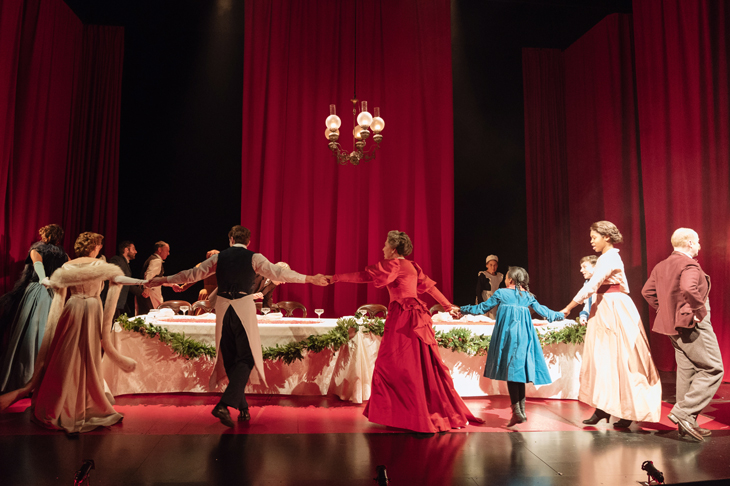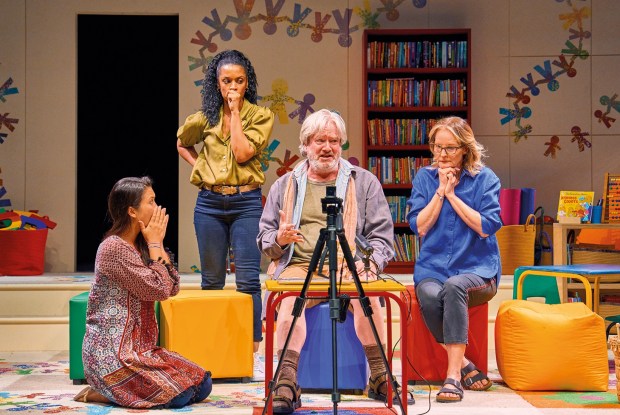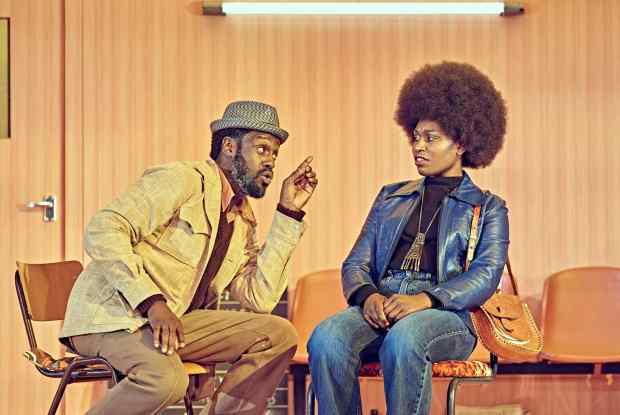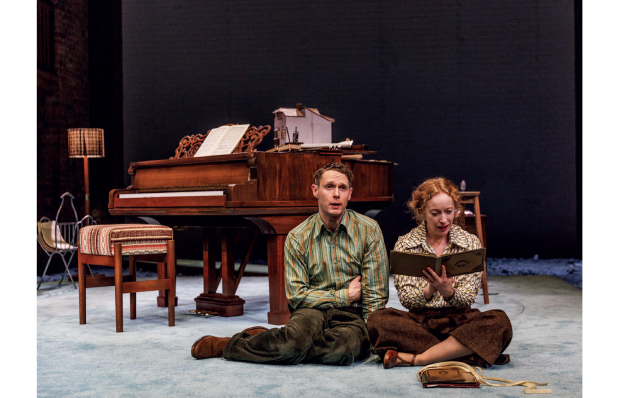Fanny & Alexander opens like a Chekhov comedy and turns into an Ibsen tragedy. Ingmar Bergman’s movie script, adapted by Stephen Beresford, has been directed for the stage by Max Webster. The children, Fanny and Alexander, belong to the famous Ekdahl acting dynasty who live in Bohemian chaos. Their home is full of jokes and pranks and sophisticated merriment, and the family business is overseen by their grandmother (Penelope Wilton), who runs their theatrical affairs with a benignly imperious eye.
Then disaster strikes. The kids’ father dies of a brain haemorrhage while rehearsing the Ghost in Hamlet. Their mother, Emilie, is comforted by the sinister Bishop Edvard who marries her and moves the children into his chilly episcopal palace. It’s like a prison camp with nice oak furniture. Meals consist of dry bread and mulched turnips. This diet suits the bishop’s crippled mother who wears aviator sunglasses and sucks up her gruel with accompanying Dyno-Rod noises. The effect is comic and disgusting but also genuinely terrifying because the bishop is a certifiable psychopath. He wants to control everyone around him because he can’t control himself. When Alexander commits a footling offence the bishop thrashes him savagely and forces him to express thanks for his punishment.
Meanwhile, the Ekdahl relatives plot to spring the children from captivity. Their plan falters. More twists follow. There is much to adore about this show. Tom Pye’s painterly sets look marvellous. Penelope Wilton and Michael Pennington are on great form as a pair of elderly lovers. And the tale is deliberately calculated to appeal to adults and children alike. Grown-ups will be deliciously horrified at the contrast between the warm-hearted Ekdahls and the brutal asceticism of Bishop Edvard. And the role of Alexander (amusingly played by Misha Handley on press night) is a gift for any 11-year-old. He opens the play with a jokey monologue and he gets to rant and rave, and even to swear vulgarly, at the adults who terrorise him. And yet I’d hesitate to take a youngster to this production because the editing has been botched. Serious cuts are needed. The show runs to three-and-a-half hours (including two thumb-twiddling 15-minute intervals), which places it well beyond a child’s endurance.
Harold and Maude is a 1960s relic written by the late Colin Higgins who directed the hit movie 9 to 5 starring Dolly Parton. This sketchy effort belongs to his apprentice years. The tale opens with Mrs Chasen, a moneyed New Yorker, trying to find a bride for her handsome but idle 19-year-old son Harold. She uses a computerised service to select suitable women but Harold sabotages every date by attempting suicide in front of his prospective girlfriend. This is a covert nod to Harold’s homosexuality. Ignoring his mom’s dynastic yearnings, Harold strikes up a Platonic friendship with Maude, a dotty Austrian countess who enjoys climbing trees, liberating zoo animals and attending the funerals of people she’s never met. She’s 79 and she offers Harold a moral education. Life is about embracing fresh experiences, she says, it’s about building bridges and destroying the fences and walls that separate people.
The play has many of the faults, and some of the virtues, of the 1960s. It’s disorganised, childish, a little preachy at times, far too ready to forgive its own failings, and conspicuously self-deluding. Maude may be a charming old dear but she’s also a thief. She keeps a set of purloined master-keys in her skirts which she uses to steal cars whenever it suits her. The script asks for all kinds of off-beat flourishes: musical solos, harmonised songs, exploding cupboards and strange sound effects, including a policeman who barks like a seal. These tricky details, potentially ruinous, are done very stylishly and the piece has a commendable integrity. It succeeds in capturing the crazed optimism of the 1960s when youngsters in the west seriously believed that universal happiness, like technological innovation, might not just be attainable but inevitable. Maude embodies that aspiration.
Director Thom Southerland deserves top marks for delivering an excellent version of a wonky script. The first half is too slow and Harold’s failed suicides become drearily predictable. But the action in the second half is crisper, much funnier and full of good surprises. There’s excellent work here from Sheila Hancock as the whimsical drifter Maude. Mrs Chasen, a sort of muted Lady Bracknell, is performed by the excellent Rebecca Caine whose dictatorial manner conceals real warmth and humour. Joanna Hickman, brilliantly funny, plays the full harem of comic girlfriends spurned by Harold. The costumes by Jonathan Lipman are a sumptuous collection that do ample justice to the multicoloured hippie aesthetic. Had I put money into this show I’d be in two minds about it. Delighted at the better-than-expected results and yet dismayed that I’d thought it worth bothering with.
Got something to add? Join the discussion and comment below.
Get 10 issues for just $10
Subscribe to The Spectator Australia today for the next 10 magazine issues, plus full online access, for just $10.
You might disagree with half of it, but you’ll enjoy reading all of it. Try your first month for free, then just $2 a week for the remainder of your first year.














Comments
Don't miss out
Join the conversation with other Spectator Australia readers. Subscribe to leave a comment.
SUBSCRIBEAlready a subscriber? Log in